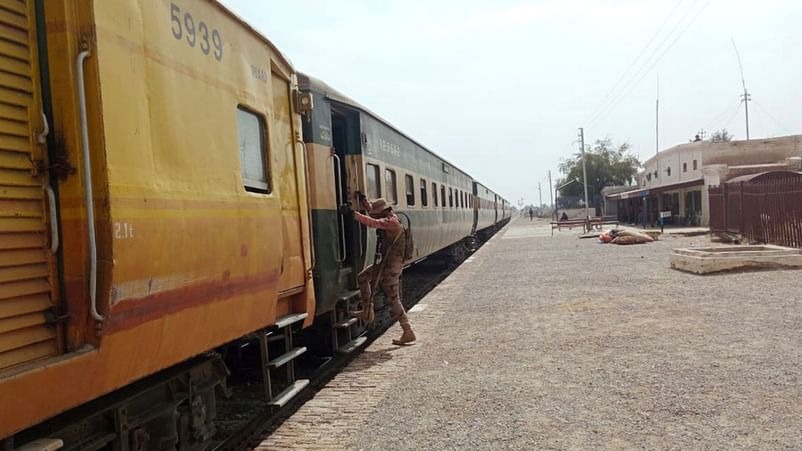
Pakistani security forces successfully neutralized all militants involved in the hijacking of the Jaffar Express train in Balochistan, according to state-run media reports on Wednesday. The intense military operation brought an end to a high-stakes hostage crisis that had gripped the nation. However, authorities confirmed that some hostages had lost their lives in the attack.
Train Hijacking Sparks Chaos and Fear
The Jaffar Express, carrying around 400 passengers in nine coaches, was en route from Quetta to Peshawar when militants derailed it using explosives. The attackers then seized control of the train near the mountainous Gudalar and Piru Kunri region, about 160 kilometers from Quetta. The incident unfolded in a tunnel, further complicating rescue efforts.
The Baloch Liberation Army (BLA), a separatist militant group, claimed responsibility for the attack, stating that they had killed six soldiers. However, Pakistani authorities have yet to confirm casualties among security forces or passengers.
Security Forces' Operation and Hostage Rescue Efforts
According to defense sources, security forces launched a counterterrorism operation, which entered its final stages after intense gun battles. A significant number of hostages, including women and children who were being used as human shields, were successfully rescued.
Earlier in the operation, security forces had already freed 190 passengers. By the end of the military operation, all militants were reported killed. However, authorities were still assessing the number of passengers who had died in the initial attack.
Challenges Faced by the Security Forces
The hostage situation was particularly challenging due to the presence of militants wearing suicide vests. Reports suggest that the attackers strategically grouped women and children around them, making direct action difficult. Security forces had to proceed with extreme caution to minimize civilian casualties.
State-run Radio Pakistan confirmed that the military operation demonstrated high levels of skill and caution, ensuring the safety of as many passengers as possible. Despite these efforts, some security personnel and train crew members lost their lives.
Eyewitness Accounts: A Nightmare Unfolds
Passengers who survived the ordeal shared their harrowing experiences. Mushtaq Muhammad, one of the rescued passengers, described the terrifying moments when the train was attacked:
"There was a huge explosion and intense firing—it was a scene that can never be forgotten."
Ishaq Noor, another passenger traveling with his wife and two children in coach number seven, recalled the panic and fear inside the train:
"The explosion was so intense that the windows and doors of the train shook. My child, who was sitting near me, fell from his seat. We immediately pulled our children under us to shield them from bullets."
According to survivors, the militants selectively targeted certain passengers. They reassured women, elderly people, and Baloch passengers that they would not be harmed. Later in the evening, the attackers began releasing Baloch civilians, women, children, and elderly passengers.
BLA’s Growing Insurgency and Train Attacks in Balochistan
This incident marks the first time a Baloch militant group has hijacked a passenger train. However, Baloch insurgents have long targeted railway infrastructure. In previous attacks, militants have used rockets and remote-controlled explosives to damage railway tracks.
Balochistan, a mineral-rich but restive province bordering Iran and Afghanistan, has witnessed a surge in insurgent attacks over the past year. The BLA and other militant factions have escalated assaults on security forces, government installations, and projects linked to the $60 billion China-Pakistan Economic Corridor (CPEC).
International Condemnation of the Attack
The attack drew strong condemnation from the international community. The U.S. Embassy in Islamabad issued a statement expressing solidarity with Pakistan:
"We extend our deepest sympathies and condolences to the victims, their families, and all those affected by this horrific act. The Pakistani people deserve to live free from violence and fear."
The European Union’s Ambassador to Pakistan, Riina Kionka, also condemned the attack:
"We strongly condemn the terrorist attack in Balochistan on 11 March. Our deepest condolences go to the people of Pakistan and the families of the victims."
Emergency Measures and Future Security Plans
In response to the attack, Pakistan Railways established emergency desks at Peshawar and Quetta railway stations to assist frantic relatives searching for their loved ones. The incident has also raised serious concerns about railway security, prompting authorities to consider enhanced safety measures.
The hijacking of the Jaffar Express highlights the growing threats posed by insurgent groups in Balochistan. While the security forces successfully neutralized the attackers, the loss of innocent lives underscores the urgent need for stronger counterterrorism strategies to prevent future tragedies.

 Share
Share
_458360041_124x80.jpg)


